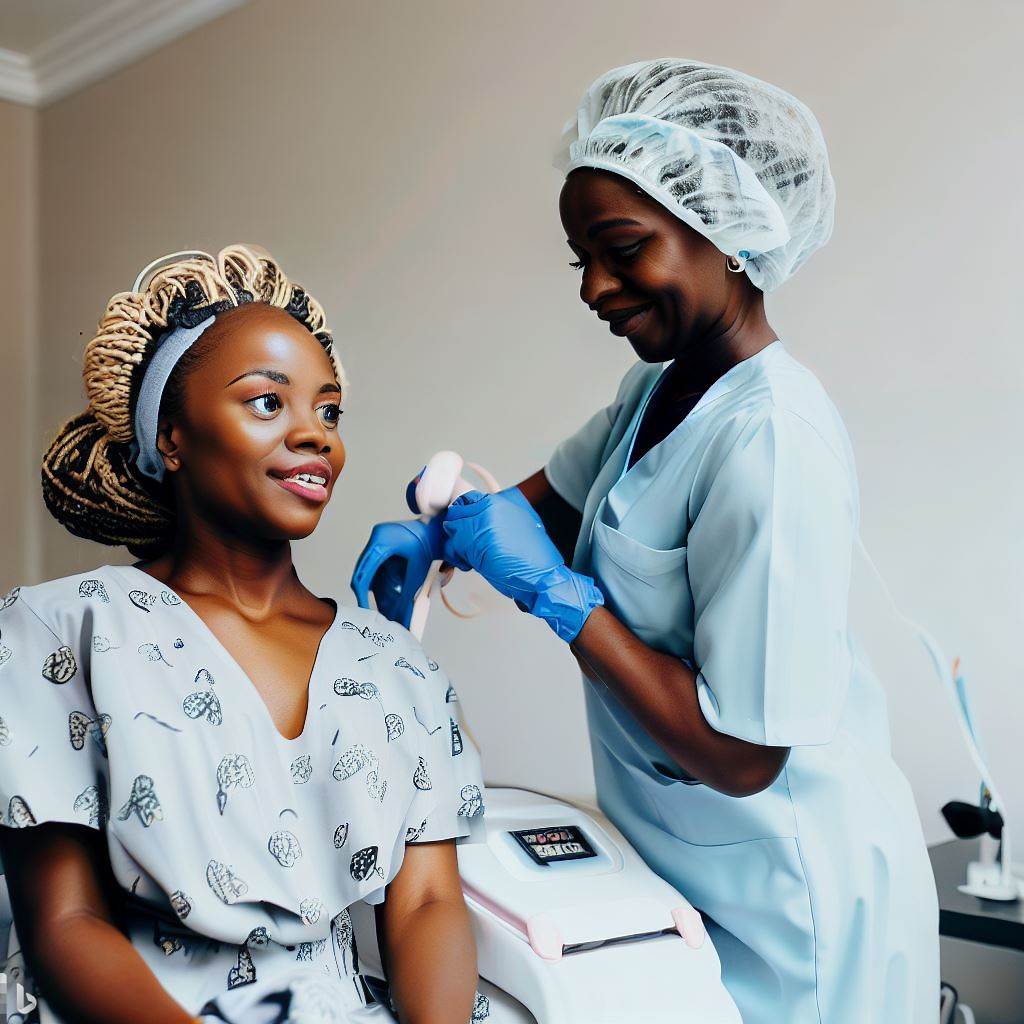Introduction
In this blog post we will explore the comprehensive guide to becoming a beauty therapist in Nigeria.
We will discuss the relevance of this topic in Nigeria and provide a brief overview of the beauty therapy industry in the country.
A. Explanation of the topic and its relevance in Nigeria
Becoming a beauty therapist in Nigeria is an increasingly popular career choice due to the growing beauty industry and the desire for self-care and well-being.
Beauty therapy encompasses a wide range of treatments and services focused on enhancing individual beauty and promoting relaxation.
As the beauty therapy industry continues to expand in Nigeria, the demand for qualified beauty therapists is also rising.
This career provides a unique opportunity for individuals to express their creativity, help others feel confident and beautiful, and contribute to the overall wellness of society.
B. Brief overview of the beauty therapy industry in Nigeria
The beauty therapy industry in Nigeria is thriving, with numerous salons, spas, and wellness centers scattered across the country.
These establishments offer a variety of services, including skincare, body treatments, hair styling, makeup application, and nail care.
The industry is fueled by a growing middle class and an increasing emphasis on personal grooming and wellness.
Many beauty therapists in Nigeria receive professional training and certifications from reputable beauty schools or institutes to ensure they have the necessary skills and knowledge to meet the evolving needs of clients.
In fact, this blog post will serve as a comprehensive guide for individuals interested in pursuing a career in beauty therapy in Nigeria.
From understanding the relevance of this topic to exploring the industry’s overview, we aim to provide valuable insights and guidance for aspiring beauty therapists.
Education and Training Requirements
A. Certification options available in Nigeria
- National Certificate in Cosmetology: A recognized certification that covers various beauty therapy skills.
- Advanced Diploma in Beauty Therapy: A higher-level certification that focuses on advanced techniques and specialized areas.
- Professional Certificate in Aesthetics: A certification program specifically for professionals interested in skincare and aesthetics.
- International Certification Programs: Various international beauty therapy certifications recognized in Nigeria.
B. The importance of formal education and training
Formal education and training are crucial for aspiring beauty therapists in Nigeria.
It provides a solid foundation of knowledge and skills necessary to excel in the field.
Benefits of formal education and training in beauty therapy:
- Enhanced skills: Formal education equips therapists with in-depth knowledge and advanced techniques.
- Industry recognition: Employers and clients value certified beauty therapists with formal training.
- Professional growth: Training programs offer opportunities for personal and career development.
- Networking: Schools and programs provide a platform for connecting with industry professionals.
- Updated knowledge: Education ensures therapists stay up-to-date with evolving beauty trends and techniques.
C. Reputable beauty therapy schools and programs in Nigeria
Some renowned beauty therapy schools and programs in Nigeria include:
- Elite Beauty School: Offers comprehensive training programs in various beauty therapy areas.
- The Beauty Academy: Provides specialized courses in skincare, makeup, and nail technology.
- Makeup Artists Studio: Focuses on professional makeup artistry and bridal makeup training.
- L’Institut Superieur de Beaute: Offers advanced beauty therapy programs with international accreditations.
- Facial Care Beauty Institute: Specializes in facial care, aesthetics, and spa therapy training.
It is essential to research and choose a reputable beauty therapy school or program that aligns with your interests and goals.
D. Factors to consider when selecting a beauty therapy school
- Accreditations and certifications: Ensure the school is recognized and accredited by relevant industry bodies.
- Curriculum and course offerings: Evaluate if the program covers the specific areas of beauty therapy you are interested in.
- Faculty and trainers: Look for experienced professionals who can provide quality education and mentorship.
- Facilities and resources: Assess the school’s infrastructure and availability of practical learning resources.
- Placement assistance: Inquire about opportunities for internships and job placements after completing the program.
By choosing a reputable beauty therapy school and pursuing formal education, aspiring beauty therapists in Nigeria can embark on a successful and fulfilling career in the industry.
Skills and Qualities Needed
1. Good Communication Skills
A successful beauty therapist must have excellent communication skills to interact effectively with clients and understand their needs.
2. Creativity
Being creative is essential in the beauty industry as therapists need to come up with unique ideas for makeup, hairstyles, and skincare treatments.
3. Attention to Detail
Paying close attention to detail ensures that beauty therapists provide precise and flawless services to their clients.
4. Patience
Patience is vital in beauty therapy as some treatments require time and clients may have specific requests or concerns.
5. Empathy
Having empathy allows beauty therapists to understand and connect with their clients on a deeper level, making them feel comfortable and valued.
6. Adaptability
The beauty industry is ever-evolving, and successful therapists are willing to adapt to new trends, techniques, and products.
7. Problem-Solving Skills
Beauty therapists often encounter challenges or unexpected situations, and the ability to think quickly and find solutions is crucial.
8. Time Management
Effective time management ensures that therapists can provide quality services within the allocated time frame, satisfying clients’ expectations.
Effective communication skills are paramount for beauty therapists in Nigeria to grasp clients’ needs and deliver impeccable service.
They must actively listen, ask pertinent questions, and gain insights into clients’ expectations, preferences, and skin conditions or allergies.
Clear communication fosters trust and enables the creation of personalized treatment plans aligned with clients’ desired outcomes.
Creativity is a cornerstone in the beauty therapy field, requiring therapists to ideate innovative makeup styles, hairstyles, and skincare routines.
They must propose unique, tailored beauty solutions that accentuate clients’ natural features, elevating their confidence.
Attention to detail is pivotal for precise service delivery, ensuring clients achieve their desired results.
Whether performing skincare treatments, makeup applications, or hair styling, every step must be executed accurately, guaranteeing client satisfaction.
For example, a client seeking a specific makeup look for an event benefits from thorough consultation facilitated by strong communication skills.
Creativity allows therapists to adapt the requested style to suit the client’s features and event theme, while attention to detail ensures flawless execution, resulting in a stunning final appearance.
In another scenario, a client’s skin concerns necessitate empathetic communication, problem-solving skills, and adaptability to recommend suitable skincare treatments.
Should initial treatments fall short, therapists adjust plans or suggest alternative solutions.
A successful beauty therapist in Nigeria embodies a range of skills: effective communication, creativity, attention to detail, patience, empathy, adaptability, problem-solving, and time management.
These qualities not only ensure client satisfaction but also bolster a therapist’s reputation and career success.
Licensing and Certification
Practicing as a beauty therapist in Nigeria requires meeting certain regulatory requirements.
Here, we will explain the steps involved in obtaining the necessary licensing and certification, as well as highlight the benefits of being a licensed beauty therapist.
A. Regulatory Requirements
- Completion of a recognized beauty therapy program or course.
- Passing the beauty therapy examination conducted by the regulatory body.
- Obtaining a valid license from the regulatory body.
B. Obtaining Licensing and Certification
The process of obtaining licensing and certification as a beauty therapist in Nigeria involves the following steps:
- Research the regulatory body: Identify the specific regulatory body responsible for issuing licenses and certifications in your state or region.
- Educational qualifications: Enroll in a recognized beauty therapy program or course that meets the requirements set by the regulatory body. Ensure the program is approved and accredited.
- Training and practical experience: Complete the required training hours and gain practical experience in beauty therapy through internships or apprenticeships. This will vary based on the regulatory body’s guidelines.
- Prepare for the examination: Study and prepare for the beauty therapy examination conducted by the regulatory body. This may include theoretical and practical components.
- Apply for examination: Submit the necessary documents and fees to register for the examination. Ensure that all requirements are met before submitting your application.
- Take the examination: Attend the scheduled examination and demonstrate your knowledge and skills in beauty therapy. Follow all instructions and guidelines provided by the regulatory body during the examination.
- Receive licensing and certification: Upon successfully passing the examination, you will be issued a license and certification by the regulatory body. This will authorize you to practice as a beauty therapist in Nigeria.
C. Benefits of Being a Licensed Beauty Therapist
Being a licensed beauty therapist in Nigeria offers numerous benefits:
- Professional recognition: A license and certification provide credibility and recognition within the beauty industry.
- Increased job opportunities: Many employers in the beauty industry require licensed beauty therapists for employment.
- Higher earning potential: Licensed beauty therapists often earn higher salaries compared to unlicensed practitioners.
- Expanded skill set: The licensing process ensures that beauty therapists have the necessary knowledge and skills to provide quality services.
- Client trust and satisfaction: Being licensed instills confidence in clients, knowing that they are receiving services from a qualified professional.
- Continuing education opportunities: Maintaining a license often requires practitioners to engage in ongoing professional development, enhancing their expertise and knowledge.
In general, obtaining licensing and certification as a beauty therapist in Nigeria is essential to practice legally and enjoy the benefits of professional recognition, increased job opportunities, and higher earning potential.
By following the regulatory requirements and completing the necessary steps, you can embark on a successful career in the beauty industry.
Read: From Beginner to Pro: Bartending Tips in Nigeria

Career Opportunities
Beauty therapy has become a thriving profession in Nigeria, offering diverse career paths for aspiring beauty therapists.
With the country’s growing population and increasing focus on personal grooming, the demand for beauty therapists is on the rise.
1. Salons
- Working in a salon is a popular career choice for beauty therapists in Nigeria.
- Salons offer a wide range of services, including hair styling, manicures, pedicures, and facials.
- Salons often provide a steady flow of clients, giving beauty therapists the opportunity to build a loyal customer base.
- Beauty therapists in salons may also have the chance to specialize in specific treatments or techniques.
2. Spas
- Spas are another promising avenue for beauty therapists looking to build their careers.
- Spas offer a variety of treatments aimed at promoting relaxation and well-being.
- Beauty therapists in spas may provide services such as massages, body wraps, and aromatherapy.
- Working in a spa environment can be rewarding, as therapists contribute to the overall relaxation and rejuvenation of clients.
3. Wellness Centers
- Wellness centers are gaining popularity in Nigeria, presenting new opportunities for beauty therapists.
- These centers focus on holistic well-being and treatments that address both physical and mental health.
- Beauty therapists in wellness centers may offer services like reflexology, acupuncture, and detox treatments.
- Wellness centers provide a unique setting for beauty therapists to combine their skills with alternative therapies.
4. Freelancing and Entrepreneurship
- Many beauty therapists in Nigeria choose the path of freelancing or starting their own businesses.
- Freelancers have the freedom to work independently and offer services to clients on a flexible basis.
- Entrepreneurial beauty therapists can open their own salons, spas, or wellness centers.
- This allows them to have control over their career, brand, and the services they provide.
The Demand for Beauty Therapists in Nigeria
The demand for beauty therapists in Nigeria is increasing rapidly, driven by various factors such as the country’s growing middle class and the influence of social media on beauty trends.
In recent years, more Nigerians have become interested in beauty and wellness, leading to an upsurge in the number of individuals seeking beauty therapy services.
This trend has created a need for skilled beauty therapists who can cater to the diverse demands and preferences of clients.
Job Opportunities in Salons, Spas, and Wellness Centers
Salons, spas, and wellness centers present numerous job opportunities for beauty therapists in Nigeria.
Qualified therapists can find employment in established salons, where they can gain experience and further develop their skills.
Spas, with their focus on relaxation and rejuvenation, offer a unique work environment for beauty therapists.
Wellness centers, on the other hand, provide opportunities for therapists to combine conventional beauty treatments with alternative therapies.
Overall, the beauty therapy industry in Nigeria offers a promising career path for individuals passionate about beauty and willing to constantly upgrade their skills to meet the evolving needs of clients.
Read: Local Ingredients: Unique Nigerian Bartending Flavors
Starting Your Own Beauty Therapy Business
- Research the beauty therapy market in Nigeria to identify potential customers and competitors.
- Develop a comprehensive business plan outlining your goals, target market, and marketing strategies.
- Create a budget and secure funding for your beauty therapy business.
- Decide on the legal structure of your business, such as sole proprietorship, partnership, or limited liability company.
- Register your business with the appropriate government agencies, such as the Corporate Affairs Commission.
- Obtain the necessary licenses and permits required to operate a beauty therapy business in Nigeria.
- Source high-quality beauty products and equipment from reputable suppliers.
- Set up a professional and inviting salon or spa space to provide services to clients.
- Hire qualified and experienced beauty therapists who are skilled in a variety of treatments.
- Invest in continuous training and development for yourself and your staff to stay updated with industry trends.
A. Importance of Developing a Business Plan and Securing Funding
- A business plan helps you outline your objectives, strategies, and financial projections for your beauty therapy business.
- It provides a roadmap for growth and helps you communicate your business idea to potential investors or lenders.
- Securing funding is crucial to cover startup costs, buy equipment, and hire skilled staff.
- You can approach banks, investors, or consider crowdfunding options to secure the necessary funds.
- A well-prepared business plan increases your chances of securing funding from external sources.
B. Tips and Advice for Marketing and Promoting a Beauty Therapy Business
- Identify your target market and tailor your marketing strategies accordingly.
- Utilize social media platforms to showcase your services, engage with customers, and run targeted advertising campaigns.
- Create a professional website that showcases your salon or spa and provides information about your services.
- Partner with local influencers, bloggers, or beauty vloggers who can promote your business to their followers.
- Offer special promotions, discounts, or loyalty programs to attract and retain customers.
- Provide exceptional customer service and prioritize customer satisfaction to build a strong reputation.
- Encourage satisfied customers to leave reviews and testimonials to help build credibility.
- Participate in local beauty events, exhibitions, and trade shows to network and attract potential clients.
- Consider offering additional services or packages to upsell and increase revenue.
Read: Safety First: Responsible Bartending in Nigeria
Challenges and Rewards of Being a Beauty Therapist in Nigeria
Being a beauty therapist in Nigeria may come with its fair share of challenges, but it is a profession that also brings great rewards and satisfaction.
In this csection, we will discuss the challenges that beauty therapists may face in Nigeria, such as competition and economic factors, as well as highlight the rewards and satisfaction that come with the profession.
Additionally, we will share success stories and testimonials from Nigerian beauty therapists.
A. Challenges Faced by Beauty Therapists in Nigeria
- Intense Competition: The beauty industry in Nigeria is highly competitive, with numerous professionals vying for clients.
- Economic Factors: The economic situation in Nigeria can affect consumer spending on beauty treatments, resulting in fluctuating income for therapists.
- Limited Resources: Some beauty therapists face challenges in accessing high-quality products and equipment due to limited availability and high import costs.
- Lack of Recognition: Despite the importance of their work, beauty therapists in Nigeria often struggle to gain recognition and respect from society.
- Client Expectations: Meeting the diverse needs and expectations of clients can be challenging, as beauty therapies vary from person to person.
B. Rewards and Satisfaction of Being a Beauty Therapist in Nigeria
- Personal Fulfillment: Beauty therapists have the opportunity to enhance the self-esteem and confidence of their clients, bringing them personal satisfaction.
- Creativity and Artistry: The beauty therapy profession allows individuals to showcase their creativity through various techniques and treatments.
- Flexibility and Independence: Many beauty therapists in Nigeria enjoy the flexibility of setting their own schedules and being their own boss.
- Good Income Potential: Despite economic challenges, successful beauty therapists can earn a good income, especially in high-end salons and spas.
- Constant Learning: In the beauty industry, there are always new trends, techniques, and technologies to learn, keeping therapists engaged and up-to-date.
C. Success Stories and Testimonials from Nigerian Beauty Therapists
- Ada’s Journey: Ada, a beauty therapist from Lagos, started her own salon and now has a loyal client base, proving that hard work pays off.
- Chika’s Empowerment: Chika, a beauty therapist from Abuja, empowers other women by providing them with training and employment opportunities in her spa.
- Bisi’s International Recognition: Bisi’s exceptional skincare skills have gained her recognition beyond Nigeria, with international clients seeking her expertise.
- Funmi’s Transformation: Funmi, a beauty therapist specializing in makeup, has transformed the lives of many brides, making their special day even more memorable.
- Happiness in Helping Others: Many Nigerian beauty therapists find joy in the positive impact they have on their clients’ well-being and self-confidence.
In short, becoming a beauty therapist in Nigeria can be challenging due to competition, economic factors, and limited resources.
However, the profession offers great rewards, including personal fulfillment, creativity, flexibility, and good income potential.
Success stories and testimonials from Nigerian beauty therapists serve as inspiration and proof that dedication and passion can lead to a successful career in the industry.
Read: Customer Service Skills for Bartenders in Nigeria
Conclusion
This comprehensive guide has discussed the key points aspiring beauty therapists in Nigeria need to know.
It emphasized the importance of education, licensing, and continuous professional development in this field.
Education is crucial as it provides the necessary knowledge and skills to excel as a beauty therapist.
It is essential to enroll in accredited training programs or institutions to gain the required qualifications.
Obtaining a license is also vital as it ensures legality and professionalism in the field.
Beauty therapists must adhere to the regulations set by relevant authorities and obtain the necessary permits.
Continuous professional development is a must for individuals aspiring to be successful beauty therapists.
Staying updated with the latest trends, techniques, and products is crucial to provide top-notch services to clients.
If you are passionate about beauty therapy, do not hesitate to pursue it. With the right education, licensing, and continuous learning, you can build a rewarding career in this field.
To further explore beauty therapy in Nigeria, check out the following resources:
- “The Beauty Industry in Nigeria: A Comprehensive Overview” – an informative book by Jane Doe
- “Beauty Therapy in Nigeria: A Practical Guide” – an online course provided by ABC Beauty Institute
- “Beauty Therapy Associations in Nigeria: Connecting Professionals” – an article by Beauty Times Magazine
- Attend national beauty therapy conferences and join relevant online communities and forums.
Remember, pursuing your passion and investing in your education and professional growth are key to becoming a successful beauty therapist in Nigeria.




